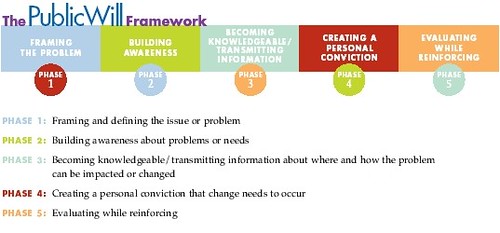The real lesson of the special elections
... including yesterday's in Boston, see "Brown upsets Coakley in Massachusetts race" and "Election dramatically alters the trajectory of Obama's agenda" from the Washington Post, is that you can never take an election for granted, that you always must have great candidates, that every office matters if you are to succeed with your agenda.
The disconnect is that the nominating process is one shaped more by the "throughput" public, while the "deciders" are the people who vote, in this case they are the "output" candidate.
-------------------
A long time ago, I read the book Strategic Marketing for Not-For-Profit Organizations by the U of Michigan Social Work professor Armand Lauffer. One of the concepts that has stuck with me over the years is that organizations have three publics:
1. The input public that provides the organization with resources;
2. The throughput public that does the work of the organization; and
3. The output public to whom the organization's activities are directed.
It happened then that I was a volunteer on the campaign of Dean Baker for Congress (Dean is one of the directors of the Center on Economics and Policy Research). Since the campaign was out of Ann Arbor, of course a big chunk of the message was about U.S. military involvement in Central America, which mattered little to aged residents of Western Wayne County who cared more about social security and other issues.
I realized, because I was reading the book at the time, that most of the campaign's messages were directed to the volunteers on the campaign--the throughput public--not the output public, the people who needed to be motivated to vote.
To get them to vote for Dean Baker, the message needed to be targeted to their interests, not the stated interests of the campaign.
(Also see the paper Public Will Building by the Metropolitan Group's Eric Friedenwald-Fishman.)

-------------------
So the throughput public being satisfied doesn't matter in the end, because they are not the ultimate audience that you are trying to reach (and change).
Who gets elected really does matter, as positive transportation and land use planning in the State of Maryland shows, between the election of Robert Ehrlich (over a consensus candidate, Kathleen Kennedy Townsend), and then Martin O'Malley in 2006.
And timing matters too.
Now the economy sucks and it's very difficult to find the money to spend on positive transportation and land use initiatives. The money was there during the governorship of Robert Ehrlich, but little happened on that score, because it was counter to his agenda.
For me the lesson of the governors races in New Jersey and Virginia isn't necessarily that the Obama Administration is on the run, but that it hasn't focused adequately on the conditions necessary to maintain momentum.
Something that I have started to realize very much over the past couple years, is that in planning, a "completed" plan isn't the endpoint of a process, it's just the beginning, because then the implementation and realization phase starts in earnest.
If you don't provide resources for implementation and for maintenance of the factors that get you there, all the effort on creating a plan has been wasted.
The same goes in politics and governance.
Labels: elections and campaigns, electoral politics and influence, progressive urban political agenda



0 Comments:
Post a Comment
<< Home